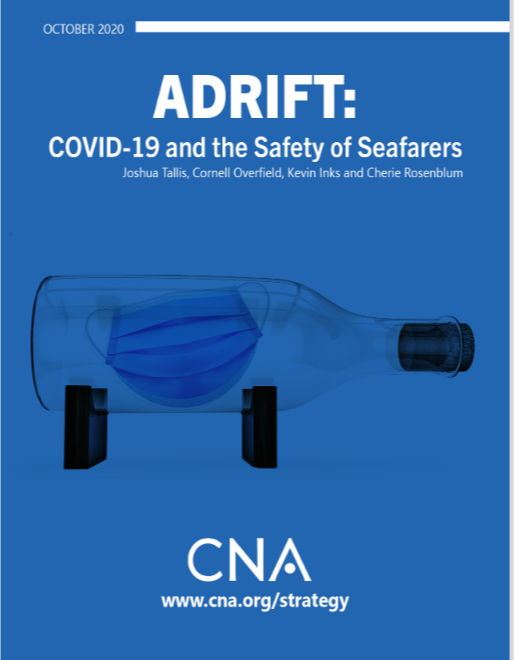Seafarers—the essential workers of the global trading system—are facing significant risks. The COVID-19 pandemic has spurred a crew change crisis, in which employers have enacted strict leave policies and longer contracts, and port states have refused to allow mariners to disembark. As a result, more than 400,000 seafarers remain stuck on their ships. Since March, seafarers and advocates have raised alarms about the mental and physical burden of these long watches. But as the pandemic approaches its first anniversary, the mounting toll on mariners is stretching beyond personal exhaustion and deeper into society and the entire blue economy. This policy paper, based on ongoing CNA analysis, surveys the direct and indirect effects of COVID-19 on seafarers, examines the follow-on effects on society, and recommends global solutions to protect maritime workers.
KEY THEMES OF THE CURRENT MARINER CRISIS
Seafarers face immediate health risks. Across maritime sectors, an infection onboard can race through tightly packed crews who have limited ready access to medical care. For example, nearly 1,000 sailors tested positive for COVID-19 aboard the US Navy aircraft carrier USS Theodore Roosevelt in March.
Society faces health risks from maritime outbreaks. COVID-19’s immediate health risks can reach even the most remote locations by sea. Isolated communities serviced by long-haul ferries or government vessels (such as icebreakers in Canada’s remote Arctic) depend on the blue economy for sustenance but may lack easy access to care facilities if the infection arrives.
Not all industries can mitigate COVID-19 risks equally. Navies and offshore energy sectors can maintain strict control over personnel movements and test frequently in order to sustain operations. However, mariners in more fractured industries such as commercial fishing work amid a patchwork of enforcement regimes. States or employers may have lax health standards or simply lack the oversight to implement safer work conditions for these industries.
Mitigation measures against COVID-19 have mental health consequences for mariners. Across maritime sectors, mariners face new mental health challenges because of pandemic precautions. Seafarers are often isolated from the societies they support because of employers enforcing strict leave policies and extended contracts, or port states refusing crew changes. Early in the pandemic, crewmember calls to mental health helplines tripled compared to the year before. Some mariners have gone on strike, and in extreme cases, some have taken their lives.
An extended blue economy crisis would have wide social consequences. The global system that the blue economy undergirds is straining. A collapse in the cruise industry would cut deeply in tourist-dependent coastal economies. A prolonged crew change crisis would deprive seafarer-producing societies of needed income. In every industry, the normalization of extended contracts and limited crew amenities could diminish interest in mariner careers, affecting the long-term training pipeline.
Sustainable response requires a whole-of-society effort. Industry, mariners, and local and national governments must cooperate to control both viral contagion and social upheaval in the blue economy. In 2021, they must implement thoughtful and compassionate policies to maintain trade flows and naval operations while sustaining seafarers and the communities they shape.
Download reportApproved for public release: Distribution unlimited
Details
- Pages: 12
- Document Number: CSI-2020-U-028490
- Publication Date: 10/1/2020
